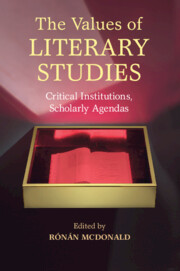Book contents
- Frontmatter
- Contents
- Notes on Contributors
- Acknowledgments
- Introduction
- 1 The Value of Criticism and the Project of Modernism
- 2 Caprice: Individual Subjectivity in Literary Criticism
- 3 The Phenomenology of Literary Valuation
- 4 Literature Is History: Aesthetic Time and the Ethics of Literary Will
- 5 Dead on Arrival: Time and the Value of Old Books
- 6 The Price of Value
- 7 To Shelter the Nothing That Happens
- 8 When Literary Criticism Mattered
- 9 Literature among the Objects of Modernist Criticism: Value, Medium, Genre
- 10 “Vale!” : Psychoanalysis, Value, and Literature
- 11 Afterlives of Comparison: Literature, Equivalence, Value
- 12 Feminism, Gender, and the Literary Commons
- 13 The Value of World Making in Global Literary Studies
- 14 Multiple Versions and Fictional Minds: Manuscript Research, Digital Editing, and Enactive Cognition in Literary Studies
- 15 After Suspicion: Surface, Method, Value
- 16 Literary Experience and the Value of Criticism
- Index
3 - The Phenomenology of Literary Valuation
Published online by Cambridge University Press: 05 November 2015
- Frontmatter
- Contents
- Notes on Contributors
- Acknowledgments
- Introduction
- 1 The Value of Criticism and the Project of Modernism
- 2 Caprice: Individual Subjectivity in Literary Criticism
- 3 The Phenomenology of Literary Valuation
- 4 Literature Is History: Aesthetic Time and the Ethics of Literary Will
- 5 Dead on Arrival: Time and the Value of Old Books
- 6 The Price of Value
- 7 To Shelter the Nothing That Happens
- 8 When Literary Criticism Mattered
- 9 Literature among the Objects of Modernist Criticism: Value, Medium, Genre
- 10 “Vale!” : Psychoanalysis, Value, and Literature
- 11 Afterlives of Comparison: Literature, Equivalence, Value
- 12 Feminism, Gender, and the Literary Commons
- 13 The Value of World Making in Global Literary Studies
- 14 Multiple Versions and Fictional Minds: Manuscript Research, Digital Editing, and Enactive Cognition in Literary Studies
- 15 After Suspicion: Surface, Method, Value
- 16 Literary Experience and the Value of Criticism
- Index
Summary
I hate moral criticism of any kind – primarily because it characteristically deals with a very limited range of values that can meet the generalizing test of moral or ethical significance. So I seek a conceptual framework for literary experience capable of reveling in how such experience might challenge any sense that the soul is simple enough to live exclusively in relation to those moral values. I imagine this conceptual framework comprising two levels. The first will align the literary with the many ways our language games resist epistemic practices. This level will stress modes of display involving participation, attunement, and exemplification. That opens the way to experiences that do not simply confirm the judgments of the discursive intellect. But were we only to characterize literary experience in this negative way, we would not have a strong account of why we are drawn to slow reading as involving significant cultural ideals. So we need a second level of analysis in order to build a positive model that provides a substantial alternative to traditional ethical thinking.
I
Almost any ethics will occlude literary value just because ethics must deal in general principles. (Even the poststructuralist praise of the event of singularity that the text offers must generalize that condition as the basis for subsequent claims about how literature enables certain ethical qualities.) So I will instead revel in the possibility that at least for literary criticism we need not rely on ethical thinking in any form. Instead I want to develop a roughly phenomenological view of values, or, more properly, of valuing because I think this approach to aspects of value will prove more flexible in adapting to a range of literary texts and more supple in characterizing the kinds of investments involved in literary experience than any form of reading sponsored by specifically ethical modes of reading. This phenomenological approach has the advantages of flexibility and of fluid passages between first-order care about objects of attention and second-order attention to the intensity involved in our various modes of engagement with particular literary texts.
I begin with some crucial distinctions. First, phenomenology lends itself to talking about noninstrumental values, which are crucial to literary experience. “Noninstrumental values” are not necessarily mere moments of fantasy released from the world of instrumental labors.
- Type
- Chapter
- Information
- The Values of Literary StudiesCritical Institutions, Scholarly Agendas, pp. 44 - 58Publisher: Cambridge University PressPrint publication year: 2015
- 3
- Cited by

